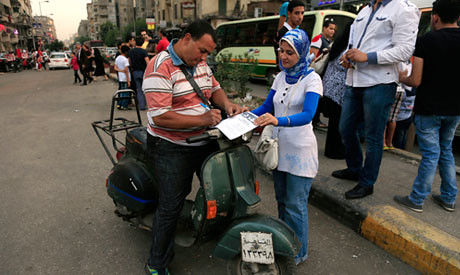
Egyptian opposition forces collect signatures expressing their discontent with the FJP party and President Morsi. Demonstrations were planned for June 30, 2013., a photo by Pan-African News Wire File Photos on Flickr.
latimes.com
After Mohamed Morsi, future of Egypt's Rebel movement is uncertain
Ahmed Abdu, co-founder of Egypt's Rebel youth movement, says the group isn't eager to jump into politics after ousting Mohamed Morsi.
By Edmund Sanders
5:02 PM PDT, July 4, 2013
CAIRO — Just a few weeks ago they were dismissed as "those kids from Rebel." But after mobilizing mass demonstrations that toppled Egypt's government, a ragtag team of chain-smoking young activists has emerged as the latest hero of Egypt's opposition.
As throngs of revelers partied Thursday night with fireworks, laser lights and live music in Cairo's Tahrir Square, Rebel co-founder Ahmed Abdu, 23, strode into the InterContinental Hotel for another interview. The rail-thin journalism student offered his hand while barking into one of his two constantly ringing cellphones, which sandwiched a pack of cigarettes.
Operating on a couple of hours of sleep over the last four chaotic days, the Cairo native said he has no plans to join the festivities until his group's agenda is fully implemented.
Similar street parties followed the 2011 overthrow of former President Hosni Mubarak, but Egypt's youth movement lost its focus, he said, allowing the Muslim Brotherhood to hijack the revolution and bring Mohamed Morsi to power.
After riding a tsunami of public frustration over Morsi's performance, Abdu, peering intently through rectangular eyeglasses, vowed that his organization won't make the same mistake.
"People can celebrate all they want, but we are not leaving the street," he said. "Just because the military council sided with us and made promises doesn't mean that we believe or trust them completely. We thank the military, but we want to make sure it doesn't involve itself in any political conflicts."
By the same token, Rebel, founded just three months ago by five self-described revolutionaries who'd grown dissatisfied after the toppling of Mubarak, isn't yet sure whether it wants to formally join the political realm either, he said, though many in Egypt are urging the group to channel its 22 million anti-Morsi petition-signers into a new political party.
At the moment, Rebel is run by a central committee of about two dozen and claims thousands of volunteers nationwide. Its goal, its leaders have said, is to fill the vacuum between opposition politicians and the movement on the street.
Major Egyptian institutions, including the military, are clearly eager to tap into Rebel's base.
Rebel's leaders not only got a seat at the table in forming the next government, but the military also largely adopted the group's road map for the coming months, including the appointment of the head of Egypt's Supreme Constitutional Court as interim president of a technocratic government.
"People are saying, 'You must run the country. We don't want anyone but you.' But we don't want to get dirty by jumping into politics," Abdu said. "We just want to keep up the pressure."
Rebel's nonpartisan approach largely explains its appeal, although some analysts caution that the group's status as a growing power broker is not necessarily assured, given the recent history of Egypt's youth movements as well as differences already arising within the group.
"They didn't insert any ideology into it, which was really brilliant," said Ziad Akl, a senior political analyst with Al Ahram Center for Political and Strategic Studies. "It became the most inclusive political movement we have seen since 2011."
But he said it would be a mistake to overestimate the group's effectiveness, noting that the key to its success was the surprise backing of Egypt's military.
Alarmed by Morsi's failure to restore stability and improve the economy, the generals quickly embraced Rebel's initiative and brought down Egypt's first democratically elected president in a popularly supported military coup.
"It just happened that the interests of Egypt's military intersected with the interests of the opposition," Akl said.
The hard part for Rebel will come as it debates its next move.
"Now that Morsi is removed, they are going to face division and debate," Akl said. "It's a time bomb. If they want to exist past Morsi's removal, they'll need to agree on goals past Morsi's removal."
Divisions are already emerging within Rebel over whether to launch a party and how closely to cooperate with the military, according to those in the group. Leaders seem reluctant to stray from their grass roots or formalize the organization. They have had no headquarters since their office was set on fire last month.
But nonpartisanship doesn't mean Rebel has no political demands. It is pushing opposition parties to rally around a single presidential candidate who is not with one of the mainstream parties to prevent the splintering of votes that helped propel Morsi to power.
If the parties don't agree, Abdu said, Rebel plans to nominate an ordinary citizen as a protest candidate, and he's confident that the person will win.
"The people are with us, and we understand what they want," Abdu said, adding that he would not be interested in the job.
"I have to be on the outside," he said, picking up a buzzing phone. "I'm a revolutionary, not a politician."
edmund.sanders@latimes.com
Special correspondent Ingy Hassieb in Cairo contributed to this report.
No comments:
Post a Comment